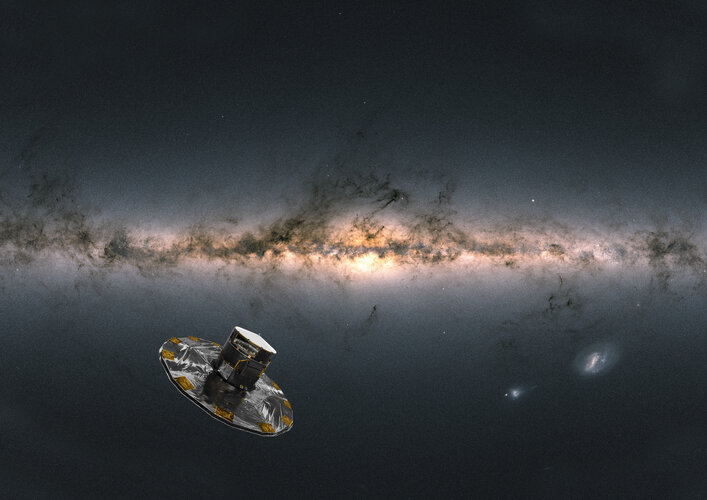
Copernical Team
Hera's solar wings are cleared for flight
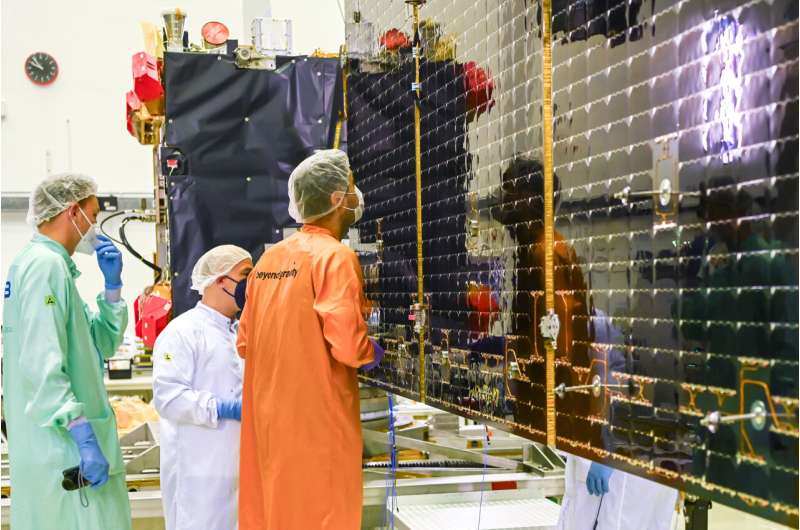
The solar wings that will power ESA's Hera asteroid mission for planetary defense as it ventures out to meet the Dimorphos asteroid have been cleared for flight. As part of its current test campaign at ESA's ESTEC Test Center in the Netherlands, the spacecraft commanded the deployment of the wings one at a time, as it will do in space directly after launch—known as a "hot deployment."
The van-sized spacecraft is equipped with two 5-m long wings, made up of three hinged panels each. This adds up to an overall area of approximately 14 square meters in all, with more than 1,600 solar cells in total. Azur Space in Germany manufactured the solar cells, which were then interconnected and arranged into working arrays by Leonardo in Italy onto panels provided by Beyond Gravity in Switzerland.
Designed and qualified to operate at temperatures between -100°C and +140°C, the panels will continue working even with the sun at its furthest distance, out beyond Mars orbit, where the spacecraft will receive only 17% of sunlight compared to a satellite orbiting Earth. In the phases of the mission in which Hera will be most distant, the solar panels will generate around 800 watts, equal to the energy needed to power a small microwave oven.
Bolivia's hypergravity blood cell test for astronaut health

Galactic Chloé - the Gaia mission
 Video:
00:12:29
Video:
00:12:29
For Gaia’s 10-year anniversary, ESA champion Galactic Chloé and the ESA Gaia team are very happy to collaborate to tell the space mission's story. From paper calculations, to the launch, and to her third data release last year, discover three of the mission's most surprising discoveries and celebrate with us Gaia’s birthday with this video produced by Galactic Studios!
Discover the video on Youtube
Boost! graphic horizontal
 Image:
Boost! graphic
Image:
Boost! graphic ESA uses terrestrial rocks to recreate the Moon’s surface
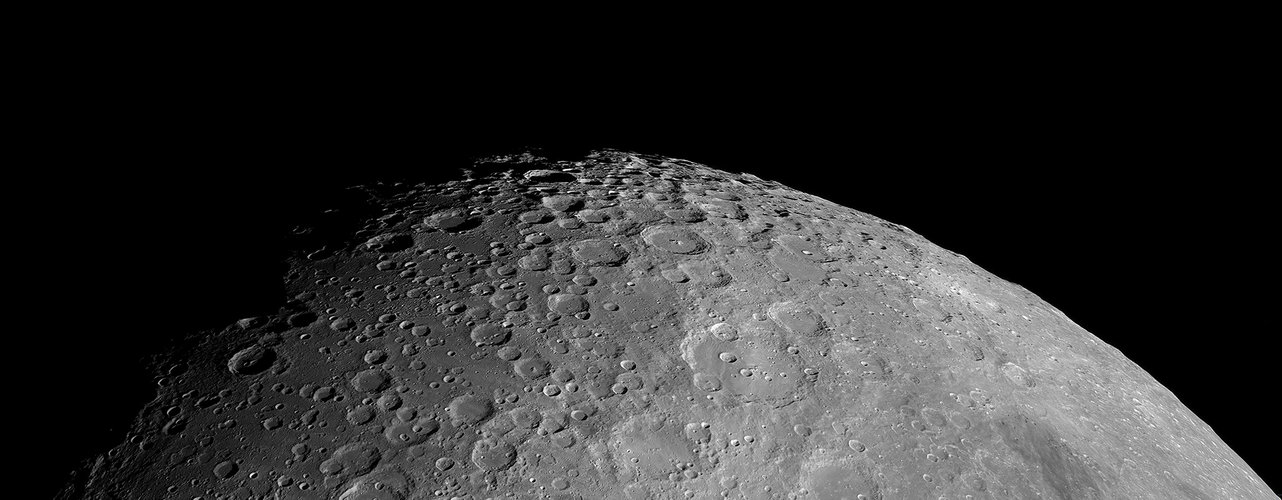
Two state-of-the-art ESA facilities are working closely to develop a simulated lunar environment that will serve as a proving ground for future exploration technologies.
China's civil military dual-use space strategy
 China has taken another significant step in enhancing its space-based Earth observation (EO) capabilities with the successful launch of the Yaogan-41 satellite. This latest addition to China's satellite constellation was launched from the Wenchang Spacecraft Launch Site in Hainan province, marking a continuation of the nation's ambitious foray into space technology.
The mission was execute
China has taken another significant step in enhancing its space-based Earth observation (EO) capabilities with the successful launch of the Yaogan-41 satellite. This latest addition to China's satellite constellation was launched from the Wenchang Spacecraft Launch Site in Hainan province, marking a continuation of the nation's ambitious foray into space technology.
The mission was execute Accurate snow mapping achieved in Switzerland through innovative AI-satellite technology
 Switzerland's majestic mountains, a haven for winter sports enthusiasts and a critical area for hydropower generation, are now subject to a novel method of snow depth measurement. This fresh approach, developed by a collaborative effort between ETH Zurich and the Swiss company ExoLabs, utilizes artificial intelligence (AI) and satellite images, marking a significant advancement in environmental
Switzerland's majestic mountains, a haven for winter sports enthusiasts and a critical area for hydropower generation, are now subject to a novel method of snow depth measurement. This fresh approach, developed by a collaborative effort between ETH Zurich and the Swiss company ExoLabs, utilizes artificial intelligence (AI) and satellite images, marking a significant advancement in environmental Bolivia’s hypergravity blood cell test for astronaut health
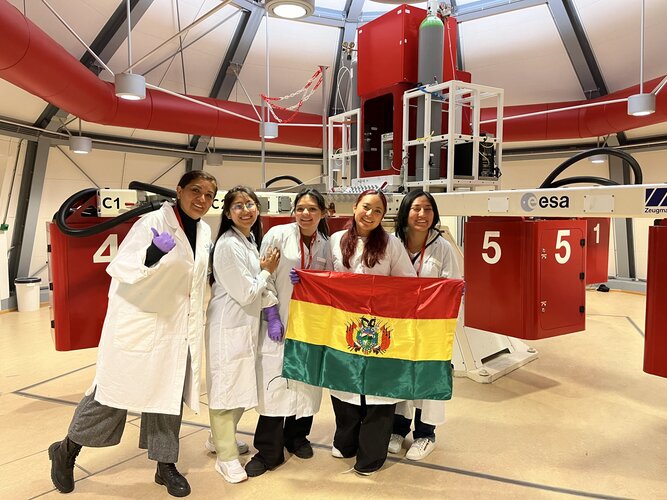
The latest international group to employ ESA’s hypergravity-generating Large Diameter Centrifuge is an all-female team from Bolivia, with access sponsored by the United Nations and ESA. The researchers are investigating whether the high gravity levels experienced during rocket launches might contribute to the anemia afflicting many astronauts in space.
Gaia's 10th anniversary
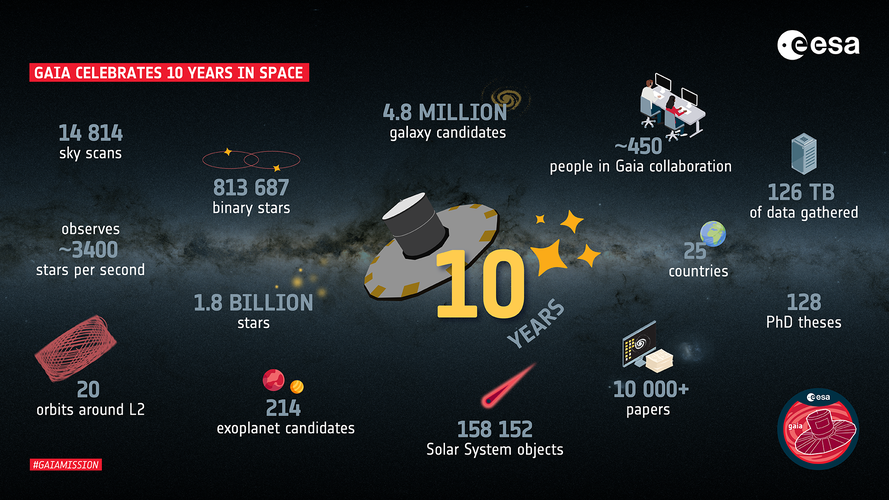 Image:
Image:
Ten years ago, on 19 December 2013, ESA’s billion star-mapping satellite Gaia launched. Since then, Gaia has been scanning the sky and gathering an enormous amount of data on the positions and motions of 1.8 billion stars, enabling numerous discoveries about the history of our galaxy.
Gaia’s catalogue is ever-growing containing data on stars and other cosmic objects such as asteroids in our Solar System, exoplanets, binary stars, and other galaxies. The Gaia collaboration, consisting of about 450 people in 25 countries, prepares the data for scientific use. This has resulted in publications of over 10 000 scientific papers
Gaia’s decade of discoveries: unravelling the intricacies of our galaxy
